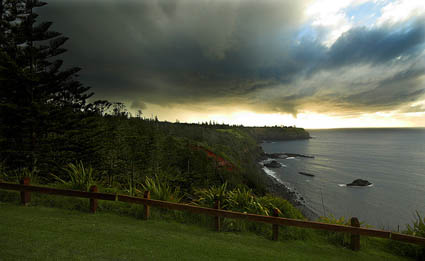The family of a former Alberta lawyer who built a global cleaning product empire and left the majority of his US$130-million estate to charity will have to live with a lower court
decision that found his domicile at the time of death was Norfolk Island, an island in the Pacific Ocean near Australia and New Zealand

.
Eldon Douglas Foote’s wife and five children had been seeking leave to appeal to the Supreme Court of Canada, arguing the proper domicile was either Alberta or British Columbia. The top court today denied that application.
The ruling is a major blow for the family. At the time of his death, aside from his substantial estate holdings, Foote controlled a charitable foundation worth about $80 million, along with other assets valued at about $10 million. The domicile of a deceased person determines which laws will be applied for estate administration matters.
The Alberta Court of Appeal, in a January decision, characterized Foote as having “lived a colourful life which took him all over the world.” But it all began in Edmonton, where he started his career as a lawyer. He left the legal profession to pursue business opportunities, and went on to create an empire around a cleaning product called Swipe, stretching from Australia to Japan and parts of Europe.
Foote had left Edmonton in 1967, at about which time he divorced his first wife, with whom he’d had five children. After leaving Alberta, he traveled throughout Japan, Australia, and Europe. He married his second wife in 1971, and eventually purchased land on the Australian protectorate Norfolk Island, which boasts beneficial tax laws. He built his residence, called Foot Nort, which is considered the largest on the island. He and his second wife received permanent residency on the island in 1977.
He split up with the second wife in 1981 and married for a third time in 1984. He and his new wife, Anne, bought a condo in Victoria, B.C., in 1999. In May 2004, Foote was diagnosed with cancer, at which time he returned to Edmonton for treatment. He died the next month.
Most of Foot’s assets were held by corporations in the British Virgin Islands, along with some investments in Norfolk Island. He owned real estate in Alberta, Australia, and British Columbia.
In 2003, Foote had three wills drawn up in Edmonton. The first will handled his Canadian assets, with his children from his first marriage named as beneficiaries. Another will for the British Virgin Islands provided benefits to Anne, along with her children, grandchildren, Foote’s six children, and a long list of other family members. The remainder of his “worldwide” estate went to the Edmonton Community Foundation and the Lord Mayor’s Charitable Fund.
A final will was created for Foote’s Norfolk Island assets. It made bequests to Anne, Foote’s children, and some other family members. His residence there was to be appraised and sold, with proceeds going to Anne, Foote’s children and stepchildren, the Lord Mayor’s Charitable Fund, and the Norfolk Island Administration.
The Alberta Court of Appeal agreed with a trial judge’s findings that, despite Foote’s wishes to come back to Canada and the purchase of his B.C. home, he had not abandoned an earlier Norfolk Island domicile of choice at the time of his death.
Anne argued the Norfolk Island domicile had been abandoned and Foote had acquired an Alberta domicile of choice when he moved to Edmonton before his death. The children, meanwhile, said he had opted for a B.C. domicile of choice in light of his Victoria condo purchase.
Yet Alberta Court of Queen’s Bench Justice R.A. Graesser ruled at trial that Foote’s plans to relocate to Canada were not finalized. He found that a domicile of choice had not been established. The Alberta Court of Appeal agreed: “The trial judge’s ultimate conclusion that Mr. Foote did not have the requisite intent to abandon his domicile of choice stands,” the court wrote.

 .
.